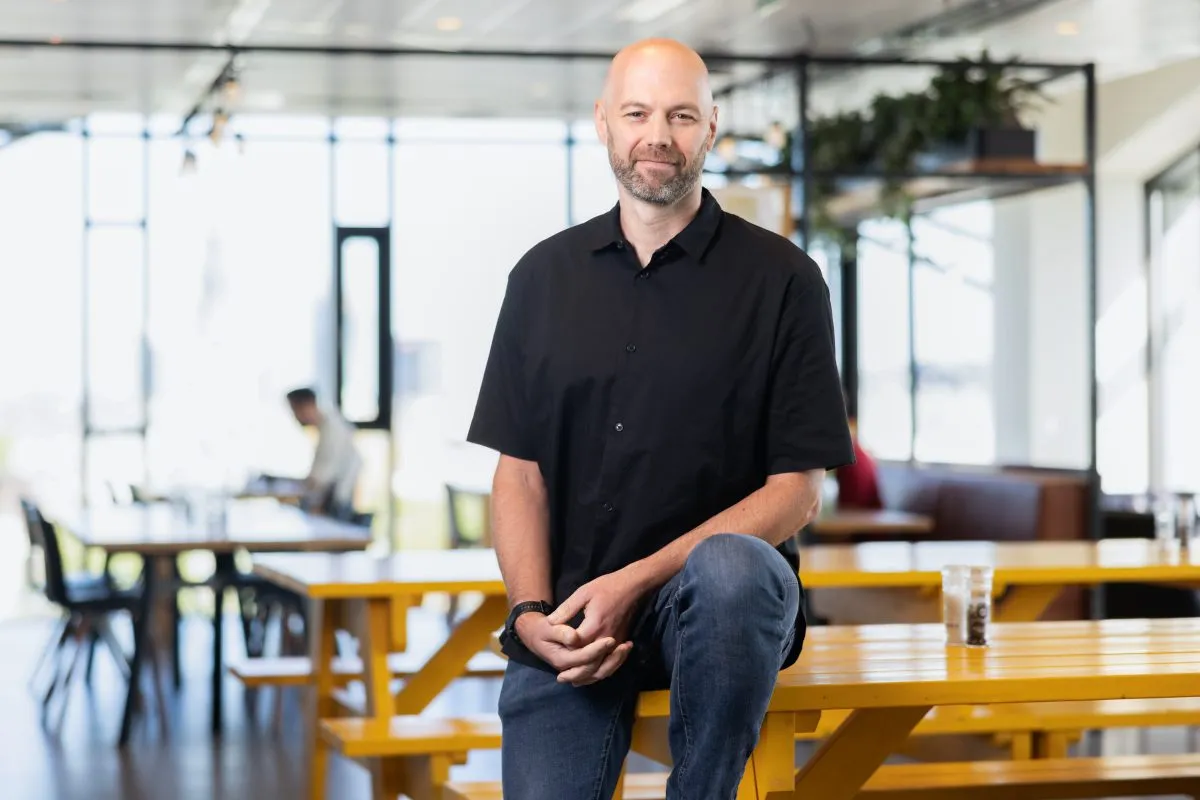Shiji Aims to Fill an Overlooked Hole in Hotel Distribution
Skift Take

Travel Tech Briefing
Editor’s Note: Exclusive reporting on technology’s impact on the travel industry, delivered every Thursday. The briefing will guide executives as they decide if their companies should “build, buy, or partner” to stay ahead.Shiji Group correctly bet that international hotel companies would shift from on-premise to cloud-based tools. So what will the tech vendor bet on next?
- To find out, I interviewed Shiji's chief operating officer Kevin King. He spoke to me from Dubai, where he's been working recently.
- King discussed the company's vision for "total distribution." He believes hotels have efficiency gaps in how they connect with resellers.
- King also covered Shiji's plan for its enterprise software platform and which companies he admires the most in the market.
Shiji Group has grown since 2019 when I last spoke with King at an on-stage event.
- It now serves about 70,000 properties outside of China, King said.
- Its biggest win is The Peninsula Group, which is shifting to Shiji's property management system across a half-dozen properties worldwide. The Peninsula Beijing made the switch first.
- Shiji has also been working with "other major large accounts, including one of the largest hotel groups in the market," King said.
- On Thursday the company said it had completed the implementation of its Infrasys Cloud POS at the flagship properties of Mandarin Oriental Hotel Group in London and Hong Kong.
- Parent company Beijing Shiji Information Technology serves many properties in China. About 20,000 of these also use Shiji Group's products, mainly because these properties market to both foreign and domestic guests.
On the "build, buy, or partner" question, many hotels have moved away from building solutions, King said.
- "The majority of hotel companies we're talking to are looking to partner, not to build," King said. "It's quite a big change for some of them."
- The most pressing issue is the labor crunch, which many hoteliers believe will outlast the pandemic. Stripping labor costs out with the help of technology is a long-term play.
- Hotels have a few key objectives, King said. They want more integrated data management, more unified operation of properties, and more mobile and automated touchpoints with guests.
- The pandemic has also prompted large or medium-sized hotel groups to adopt cloud services faster. The cloud has an edge over on-premise systems because hotels pay slow-drip subscriptions rather than large upfront costs.
King argued that the hotel sector is on a journey to what he called "total distribution."
- "Total distribution is something not a lot of people understand yet," King said. "It means being able to communicate anything and everything to all of one's distribution partners."
- Today, hotels have images of their property and information about their amenities and services, and they need to distribute that data to their third-party distribution channels.
- Hotels often share the information in manual ways. Some create Excel spreadsheets and email them to every partner who needs them.
- "What's worse is that many of the distribution channels can't consume that content dynamically," King said. "We need to replace manual, repetitious workflows with digitized, one-to-many workflows."
Attribute-based booking will appeal to consumers, King predicted. But the sector needs to put the remaining technical infrastructure in place to support the concept first.
- Attribute-based selling is when a traveler picks what they want — such as a king-size bed or a view from a high floor — one by one until getting a bundled price.
- Shiji's enterprise platform, Amadeus's, and others' have begun attributed-based selling.
- Yet the industry needs to build technical foundations so hotels can offer their attribute-based offers to online resellers and other partners. Today, all the attributes aren't distributed effectively.
- "People think of distribution as only involving ARI [availability, rates, and inventory]," King said. "But it's more than that."
- To oversimplify, "availability" means computers sharing that, say, a dozen rooms are available on June 12. "Rates" may refer to rate types, such as the rack rate and then an early bird special of 10 percent off the rack rate for early booking. "Inventory" could mean six deluxe rooms and six standard rooms are available on that date.
- Attribute-based booking can't work if systems only share availability, rates, and inventory to third-party channels.
- In short, it's another missing piece of the puzzle on the way to the industry offering "total distribution," King said.
When King looked out at the landscape, he saw some bright spots.
- One of the companies he admires is Cloudbeds, whose CEO I interviewed in a previous Briefing and which Softbank invested in late last year.
- "I love the folks at Cloudbeds," King said. "They know their market, and they focus on becoming strong in that market. They maintain a strong vision."
- King also praised Accor's model under Floor Bleeker, which I covered in an earlier Briefing. That model blends a mix of in-house tech investment with creating "a community" of partner tech vendors.
- "What Floor and his team are doing is very smart," King said.
- King is also an admirer of Kalibri Labs, a revenue strategy startup led by Cindy Estis Green. But after helping Kalibri grow since investing in its benchmarking platform, Shiji is selling its shares to let Kalibri grow with independent investors.
King is less charitable toward some other players in the market. I asked him about the rise of a few venture-backed tech vendors.
- "If you're a hospitality company that builds your own tech stack for yourself, that model can work well for you," King said. "You're delivering everything that you need, and you compensate for all the things you haven't got with some point solutions. We know companies in China, Europe, and elsewhere using that model, and many are building cool technology."
- "The problem comes when they think they've created a technology company and they try to sell the software to somebody else," King said.
- "When you try to sell it to somebody else, that customer will ask why they should give all their data to you if they're competing with you on the other side of your business as a hospitality brand," King said.
King predicted that central reservation systems would play a role for some time to come at the back-end of the data picture.
- "The big guys in central reservation systems, such as Sabre and Amadeus, will be there for some time to come," King said.
- "But if they try to connect the central reservation systems to property management systems and have it all, they'll find it's pretty difficult to do that," King said.
- "In the meantime, other players may help hotels get smarter about how to deliver data on the front end," King said.
- "Central reservation systems are a completely different animal," King said. "They don't do everything you expect them to do for the needs at the front of a hotel. But if you can connect them in really real-time, you can make amazing things happen for the hotel and a guest."
One-stop, one-size-fits-all solutions aren't yet practical, King said.
- "There's been a lot of talk in the industry about how one technology provider could provide everything a large hotel group, a small hotel group, or an individual hotel might need," King said. "I don't think the industry is there yet — technologically speaking — when it comes to offering a unified platform, ranging from a central reservation system, a customer relationship management system, a meeting-and-events solution, and all the rest."
- In the meantime, hotels will have to work with "a community" of vendors, picking and choosing solutions that fit their needs.
- "A key decision a hotel has to make when improving its tech stack is to make sure there will be a single guest profile for each traveler — a profile which captures their preferences and status and other details," King said. "You can't really designate that to multiple platforms. You've got to decide where the primary location for the single guest profile is. Maybe you put it in a membership system that belongs to your hotel group that runs a loyalty program. It depends."
- Data security and data sovereignty are other key factors.
- "Tokenizing" data can keep customer data safe from unauthorized third-party access, King said. Tokenizing essentially means hiding sensitive guest data by disguising it with a new set of numbers called a “token" and only releasing it via the token to third-party systems.
Shiji Group's next big task is to enhance its enterprise platform.
- Before the pandemic, Shiji had been on an acquisition spree.
- "We need to platform these different technologies we've acquired, meaning we've got to bring the product functionality onto our enterprise platform," King said. "That requires development work to build microservices."
- "For example, we have technology that helps the typical resort manage its golf and spa services," King said. "We want to bring that functionality, which came from our Concept acquisition, onto the platform."
- "Infrasys is our point-of-sale solution, and we want to bring that closer to the platform, too," King said. "We also want to link to the platform ReviewPro, which we've enhanced from being a guest intelligence tool to also offering guest experience automation."
Internationalization has been important for the parent company, Beijing Shiji Information Technology.
- The parent public company generated $522 million (or 3,325 million yuan) in revenue in the 12 months to September 30. It suffered a $12 million net loss.
- Domestic Chinese subsidiaries offer four property management systems, including a flagship iPMS, to hotel groups catering to local travelers.
- The company's master hotel software share in China's five-star hotel market is about 60 percent.
- The company's business-to-business segment revenue has recently become dominated by overseas sales via Shiji Group.
- The pandemic drove the net losses, but the company may see a margin squeeze in the near term even after the pandemic recedes. That's because the company's model has been shifting from traditional software, hardware, and maintenance revenue to software-as-a-service subscription revenue.
- A new multi-tenant hosting environment and standardized solutions allow for low incremental costs to host, support, and deliver new customers.
- So, in theory, once the number of customers reaches a certain level, the company can reduce the percentage of selling and development expenses and achieve greater profitability.
- In the meantime, Shiji must invest more in its tech while its revenues are slowing relative to historical trends. Hotels are switching from paying license fees upfront to the slow-drip subscription fee model.
The bottom line: Shiji Group's vertically integrated approach has risks. The parent company made successful transitions before, such as with server databases in the 1990s. Can it pivot again, this time through an international, platform-based strategy? Will its pitch to solve "total distribution" problems give it an edge?
I always read tips and feedback. Reach me at so@skift.com and Twitter @sean_oneill. For discretion, use a non-work device to contact me via sean.f.oneill@protonmail.com or ask for my Signal account.





